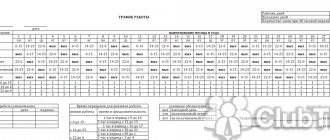Overtime and crazy work schedules have long become the norm. Employers do not always fulfill their responsibilities. The question of how many hours a week a woman should work becomes awkward. But the Labor Code of the Russian Federation for workers in all industries provides benefits regarding the length of the working day, week and provides additional payments for hours spent overtime in production. All employers are required to comply with the Labor Code of the Russian Federation, regardless of the form of ownership and status of the enterprise, including individual entrepreneurs.
Labor Code for Women
The legislation takes into account that almost all household chores fall on the shoulders of wives, mothers and grandmothers - it’s like a free second shift after the main job for money. According to the Labor Code of the Russian Federation, women are provided with benefits in the length of the working day and week.
The employer is obliged to take into account all time spent at work. Every hour must be recorded. By looking at the timesheet, you can find out how many hours a particular woman works per week or month. Strict recording of working hours will help ensure fair calculation of wages and bonuses, and will also make it possible to determine who is owed additional money.
The length of stay at production should not exceed 40 hours for female workers in all industries. An exception may be a profession such as a police officer, where the work schedule is not standardized, and the specifics of the work do not allow establishing strict limits on work time.
When drawing up an employment contract, the employer is obliged to take into account all the nuances associated with possible overtime hours and follow the law. Before signing, it is better for a potential employee to study all the points in order to prevent possible problems.
Harmfulness
The average working day, as we found out, is 8 hours. Please note: disabled people will work as much as possible per shift as the doctor allows them. This requires a medical certificate. But what about personnel employed in harmful or dangerous work? Do they really work as hard as everyone else?
Not at all. There are special rules for them too. You can set the length of the working day at 8 hours if you perform your job duties for a total of 36 hours per week, according to your employment contract. With a 30-hour week, you are supposed to work no more than 6 hours. Less is possible, more is not. Otherwise, it is regarded as overtime work. Or illegal. It all depends on the availability of additional payment for your work.
Time worked tracking
The management is obliged to accurately and timely take into account the time worked by the woman. This is usually done by preparing a timesheet each month if the salary is accrued once for that calendar period.
The document contains information based on the facts of leaving or not appearing at the enterprise, as well as the number of labor hours. Days of sick leave, vacation, or other cases of absence at the enterprise are recorded with special symbols. Such a timesheet will allow accounting employees to fairly accrue money based on hours worked, and take into account overtime, holidays and other overtime.
Drawing up a work schedule
The required work schedule must be specified in the employment contract. Before starting an activity, a woman must see in what mode she will have to work. The employment contract requires information about additional payment for going to work outside the established shifts, on holidays.
The standard working week according to current legislation is 40 hours. This time must be divided by the number of expected shifts at the discretion of management. Sometimes the actual time spent at work does not coincide with the established standards. Production demands may be such that 40 hours per week is not sufficient to distribute shifts. All excesses must be recorded and paid at an increased rate.
Rest time must be taken into account - for example, after a 12-hour shift, a worker must have at least 42 free hours. This is necessary for full recovery of strength and is especially important for work that requires additional attentiveness, work in high-risk conditions, heavy physical labor, hazardous industries.
In some cases, if there is a staff shortage, an enhanced work schedule may be temporarily introduced. This regime should provide for all necessary additional payments, but the overtime work period established by law is no more than 4 hours a day or 14 a week.
Part time
What else is worth paying attention to? In fact, the length of the working day in hours may vary. It is difficult to talk about how much you should work (to the maximum) in a particular position. Only a few restrictions exist in this regard. And how to distribute the required 40 hours a week is up to each employer. Up to certain limits, of course.
Only in some cases, by agreement of the parties, part-time work can be established. True, not all employees can request it, but only some. Please note that in this case payment will be made in accordance with the time worked.
Another point to consider is that part-time work does not affect the employee's benefits package in any way. He has exactly the same rights to paid vacation and sick leave as other personnel. It is very simple to remember this condition: regardless of what working day is established (its duration), all employees are equal in relation to the social package provided by the employer.
Who is eligible for this feature? Pregnant women first. Further, the normal working hours may be reduced at the request of the parent (guardian) of minor children. But only if they are under 14 years old. If we are talking about disabled children, then before they reach adulthood, you can ask for a shortened version of work in the company. This may also include persons who care for a sick relative. But this requires a medical certificate. Without it, they have every right to refuse you.
Benefits for mothers and pregnant women
Bearing and giving birth to a child is a serious challenge. A pregnant woman is considered healthy, but hard work and regular employment may not be available. How many hours a pregnant woman should work is left up to the expectant mother herself to consider. It is also possible to switch to another, easier activity. The ability to choose during such a crucial period makes life easier, helps you maintain your health, and focus on your condition and raising your baby.
There are bosses who refuse to enter into contracts with pregnant women, mothers of small children, or simply because the applicant is young (“She’s still going on maternity leave”). This is illegal and can be appealed in court (Article 64 of the Labor Code of the Russian Federation). Also, when entering a job, pregnant women cannot be given a probationary period in the first stages of work.
The mother of a child under 14 years of age has the right to ask for a lighter work week. The same benefit is provided for pregnant workers and parents of disabled children under 18 years of age. A woman can ask for a part-time working day when drawing up a contract or in connection with the child’s frequent illnesses later (Article 93). The administration is obliged to satisfy this request. Remuneration is determined in accordance with the number of recorded working hours or according to output, if the work is associated with a percentage of the resulting product of labor. With a light work schedule, part-time or a week, the length of service is accrued under normal conditions; this also does not affect the duration of annual leave.
According to Article 96 of the Labor Code, mothers, guardians and fathers of children under 3 years of age, and single parents can work night shifts only with their written permission, if their health condition allows. The employer does not have the right to independently change their schedule or force them to work at night. Engaging disabled women and mothers of small children to work overtime without written consent is also prohibited by Article 99. The employer is obliged to notify female employees in writing of their right to refuse additional work and obtain a signature from them that they are familiar with this right. Few people know about this law, but it gives women advantages and will not allow employers to force their employees to spend extra time at work.
You may be interested in: What privileges do pregnant women have at work?
Pregnant women at work are required to transfer to lighter work, reduce their production rate after providing a certificate about their condition from a doctor and a written statement. The average salary remains the same (Article 254). If the application is ignored, the expectant mother may not go to production until her request is satisfied. In her previous place with difficult conditions, management has no right to force a woman to work. The benefit also applies to mothers of children under 1.5 years of age. The previous salary remains until the child grows up.
Women's work week
Women belong to a separate category of workers, especially protected by law. Various benefits and relaxations in work and rest regimes are provided for them. The length of the working week (WW) is one of the adjustable elements of women’s work.
A shortened working week for women is discussed not only in the Labor Code, but also in other legal acts.
For example:
- Art. 320 of the Labor Code of the Russian Federation determines the possibility of establishing a work permit lasting 36 hours for women performing labor functions in the regions of the Far North and equivalent areas;
- Resolution of the Supreme Council of the RSFSR dated November 1, 1990 No. 298/3-1 “On urgent measures to improve the situation of women, families, maternal and child health in rural areas” established a 36-hour working week for women working in rural areas with the same salary as in full weekly work (40 hours).
For women with children, the state provides benefits for the duration of RN:
- if children are under 1.5 years old;
- for older children (up to 14 years old).
In relation to the first category - nursing mothers - the law does not provide for a direct rule on a reduced pH. However, the RN of this category of workers still has a reduced duration due to the provisions of Art. 258 of the Labor Code of the Russian Federation additional breaks for rest and nutrition. At the request of the woman, these breaks can be transferred to the end of the working day, which reduces the 8-hour working day by an hour. A break to feed a child is paid in the amount of average earnings.
If a woman has an older child (under 14 years of age), then, upon her application, a part-time working day can be established at the normal duration of the RN with payment in proportion to the time worked.
Get acquainted with the legally established guarantees for women with children from the materials on our website:
- “Assignment and payment of child care benefits up to 1.5 years old”;
- "Children's benefits have been indexed."
Length of working day for all women
A 40-hour work week is legally established for everyone. How many hours a day should an ordinary woman work? According to Article 100 of the Labor Code, the work shift regime takes into account the standard length of the work week. Typically, employers divide the number of hours by the number of working days. There are 5, 6-day weeks, as well as work schedules with shift or sliding hours. Planned breaks and the start time of the working day are taken into account. For example, with a 5-day week, the length of the day will be 8 hours with one hour break for eating or resting.
Shortened working week for teenagers, harmful people and disabled people
The working life of the younger generation is marked by a shorter working week. In this case, the duration varies depending on age and cannot exceed:
- 24 hours - for teenagers under 16 years old;
- 35 hours - for the working young generation aged 16 to 18 years;
- 17 hours - if a minor worker simultaneously receives secondary education.
If the company’s employees are exposed to unfavorable factors when performing their work functions, the duration of the RN should be less than the legally established 40-hour norm.
Study dangerous and harmful production factors with materials from our website:
- “Dangerous and harmful production factors (list)”;
- “What refers to harmful working conditions (nuances)?”
The time frame for RN in this case is as follows:
- no more than 36 hours - if employees come into contact with dangerous and harmful factors;
- no more than 24 hours - if workers work with dangerous chemicals or weapons.
The reduction in the working week of this category of workers is dictated by the need to preserve their health under the influence of unfavorable conditions during work.
For members of the workforce whose health and ability to work have already been partially lost (disabled people of groups 1 and 2), the duration of the RN is also set in a shortened version. They are required to work no more than 35 hours a week.
Shift and flexible work schedule
Management in production with a shift schedule is obliged to ensure that the number of shifts does not violate the legally established 40 hours. That is, there should be no more than 4 12-hour shifts - the rest is considered overtime. When drawing up a schedule, management must take into account the ratio of weekends and weekdays so that the employee has time to rest. It is impossible to arrange shifts one after another in a 12-hour working day with a break between shifts of less than a day.
Pre-holiday shifts under the standard schedule are shortened by an hour so that people can prepare for the upcoming event.
If you have to work on a daily schedule, the employer must provide at least 3 days off after the shift. Opinions differ on how to qualify daily shifts: some bosses believe that they are dealing with a sliding schedule, while there are supporters of the definition of “shift work.”
A sliding or flexible schedule determines the duration of shifts and the number of days off by prior agreement of the parties when drawing up an employment contract. Shift work implies a strict distribution of labor time in order to use equipment more constructively, as well as in the event that production needs do not allow establishing a legally acceptable daily schedule.
Information about the work schedule is required to be provided when applying for a job. Information about changes to the schedule must be given to employees no later than a month before it goes into effect. It is prohibited to force a worker to work 2 shifts in a row. If the replacement employee does not come to work, her colleague can be asked to work overtime for no more than 4 hours.
A salary increase is provided for night hours: the duration of such a shift should be shorter by an hour with a shift work schedule. Under flexible time conditions, the night shift is not shortened, which is more beneficial for the employer. It is not possible to record working hours according to a standard 40-hour work week with a daily schedule. The employer is obliged to ensure that the amount of time worked does not exceed the permissible norm for a longer period (month, quarter), and the duration of the accounting time should not exceed a year.
Overtime will be all hours worked in excess of the standard time based on the norm of 40 hours per week. Overtime is paid for the first 2 hours at 1.5 times the regular salary. For longer additional work, the payment doubles.
Work on holidays is paid additionally. According to Article 153 of the Labor Code, employees are required to pay money at a double rate. The number of overtime and additional hours cannot exceed 16 per week and 4 per day.
How many hours a woman should work per month is determined according to a 40-hour work week. This number is multiplied by the number of weeks in the month.
Standard working hours in rural areas for women
Women's work in rural areas cannot be called easy. It requires a large investment of physical strength, and in addition to work responsibilities, a woman has to take care of her own garden, home, and children. Village workers are entitled to a benefit in reducing their working time to 36 hours. This law was adopted back in 1990. This norm applies to all enterprises located and registered in the village. Work exceeding the norm is subject to additional payment in accordance with the regulations on overtime work.
For rural teachers, these 36 hours include not only lessons taught, but also checking homework, drawing up teaching materials, etc.
The position, place of residence and salary of the employee herself do not affect the application of this law. If a woman works in an enterprise that is registered in the city, but actually operates in the village, this rule is invalid - the usual week of 40 hours applies to her.
Overtime
However, in some cases, your working hours may exceed the normal 40-hour week. We are talking about overtime work. Overtime is considered to be activity in excess of the duration of the working day established by current legislation. Such work is permitted in exceptional cases provided for by law and is usually associated with emergency situations. Overtime work can be organized in the following cases:
- carrying out work to ensure the country's defense capability;
- the need to prevent disasters, accidents, as well as to quickly eliminate the consequences of emergency situations;
- carrying out public works on utilities, transport, communications;
- the need to complete work that, due to various kinds of unforeseen circumstances or delays for technical reasons beyond the control of the employee, could not be completed within the required time frame, in the case where the cessation of activity may cause damage to state or public property.
And you also need to know that work beyond the norm can only be carried out with the permission of the enterprise trade union and should not be more than four hours for two consecutive days for each employee and more than one hundred and twenty hours per year.










